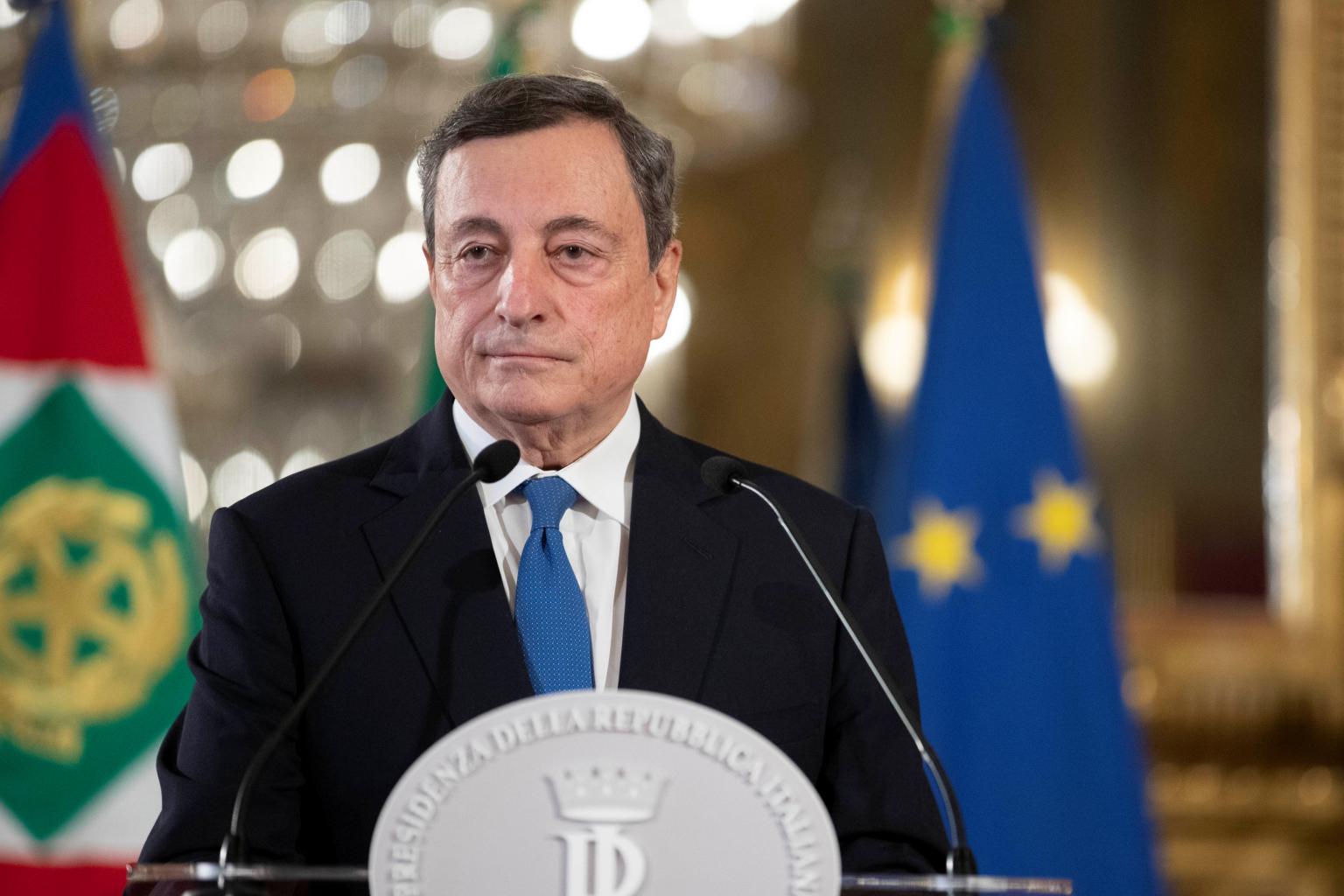Ex-ECB chief Mario Draghi gets nod to form new government and guide Italy out of crisis
Sign up now: Get ST's newsletters delivered to your inbox

Mr Mario Draghi will now begin consultations with party leaders.
PHOTO: REUTERS
ROME (NYTIMES, REUTERS, BLOOMBERG) - Mr Mario Draghi, the former head of the European Central Bank who is largely credited with helping to save the euro, accepted a mandate from Italy's president on Wednesday (Feb 3) to try and form a new unity government that would guide the country out of the pandemic and through economic recovery.
Until as recently as Tuesday, the idea of Mr Draghi replacing Mr Giuseppe Conte as prime minister remained a pipe dream for the many Italians frustrated with a governing coalition that seemed paralysed by ideological schisms and incompetence, especially as the coronavirus pandemic raged and economic devastation set in.
But on Tuesday evening, President Sergio Mattarella summoned Mr Draghi and appealed to "all the political forces in the Parliament" to support a "high-profile government" to meet the historic moment.
He made it clear Mr Conte's tenure was over and the new players, potentially political leaders proposed by the parties supporting Mr Draghi or an all-star cast of politically unaffiliated economists, judges and scientists, was ready to take the stage.
In a brief statement after receiving the mandate from Mr Mattarella, Mr Draghi said the country faced "a difficult moment".
"I will look to Parliament, the expression of the popular will, with great respect," Mr Draghi said, adding that he hoped for unity from political forces as well as society at large, and would return to Mr Mattarella to tell him of the outcome of his talks. He did not give any timeframe.
Italy's stock market rallied on Wednesday in response to the news that Mr Draghi had been lined up to lead the Italian government. He will now begin consultations with party leaders over the coming days in an effort to form a new Italian government.
Forging a majority
Mr Draghi is himself no political novice. He has served in past Italian governments, was a director of Italy's treasury and knows well the machinery of government at both the European and Italian level.
The 73 year old will now have to sound out leaders of political parties as he tries to forge as broad a parliamentary majority as possible. Outgoing Premier Giuseppe Conte failed in a comeback bid following the defection of a junior ally.
The country's parties are divided on a Draghi-led government. He can count on the backing of the centre-left Democratic Party, the second-biggest force in Mr Conte's former alliance, as well as centrist, pro-European groups. The centre-right Forza Italia party of former premier Silvio Berlusconi could also support Mr Draghi, although its lawmakers are divided.
Mr Matteo Salvini, leader of the anti-migrant League, the biggest party in the center-right bloc, left the door ajar for a Draghi government, telling daily Corriere della Sera: "The problem isn't the name of the person. The point is what he wants to do and with whom."
Mr Salvini said the priority for Italy should be to avoid tax increases, and reiterated his call for early elections in May or June.
But the Five Star Movement, the biggest force in Parliament and Mr Conte's main backer in the last government, has refused to support Mr Draghi. Mr Vito Crimi, political leader of the group born as an anti-establishment force, said past administrations led by technocrats had created "extremely negative consequences for Italian citizens".
The fractious party could, however, find itself split over the issue, with some lawmakers possibly agreeing to back Mr Draghi.
Draghi's agenda
If Mr Draghi is confirmed as premier, his agenda will be dominated by the pandemic - which has caused almost 90,000 deaths in Italy - and a faltering vaccination campaign. He will also have to come to grips with a debt-plagued economy that shrank 2 per cent in the last quarter of 2020, the worst performance among large European countries.
Another key item on the agenda: How to manage and spend the country's €209 billion (S$335 billion) share of the European Union's recovery package, the issue which led former premier Matteo Renzi to pull the plug on Mr Conte's government.
A trained economist, Mr Draghi is credited with shoring up the euro at the height of the debt crisis in 2012 with his "Whatever it takes" speech. He started the quantitative-easing programme of sovereign debt purchases which has subsequently been expanded to become a key tool in supporting the European economy during the pandemic.
Mr Draghi ended his eight years as the helm of the ECB in 2019, and ever since, he has kept pundits guessing on whether he would consider a role in Italian politics.
Possible finance ministers in a Draghi-led Cabinet include Mr Fabio Panetta, an ECB executive board member, and Mr Carlo Cottarelli, a former International Monetary Fund executive who nearly became premier himself in 2018, daily la Repubblica reported on Wednesday.


